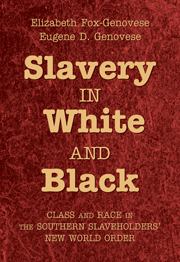Book contents
- Frontmatter
- Contents
- Preface
- Manuscript Collections Cited
- List of Abbreviations
- Slavery in White and Black
- Introduction
- 1 The Impending Collapse of Capitalism
- 2 Hewers of Wood, Drawers of Water
- 3 Travelers to the South, Southerners Abroad
- 4 The Squaring of Circles
- 5 The Appeal to Social Theory
- 6 Perceptions and Realities
- Afterword
- Index
2 - Hewers of Wood, Drawers of Water
Published online by Cambridge University Press: 05 June 2012
- Frontmatter
- Contents
- Preface
- Manuscript Collections Cited
- List of Abbreviations
- Slavery in White and Black
- Introduction
- 1 The Impending Collapse of Capitalism
- 2 Hewers of Wood, Drawers of Water
- 3 Travelers to the South, Southerners Abroad
- 4 The Squaring of Circles
- 5 The Appeal to Social Theory
- 6 Perceptions and Realities
- Afterword
- Index
Summary
Men may grow gray, and slavery will exist, and the only question is as to the kind of slavery, white or black, voluntary or involuntary. It will exist one way or the other, growing out of the very organization of society. This conclusion cannot be resisted.
—Andrew Johnson (1856)Common sense suggests that no southern politician in his right mind dared to preach Slavery in the Abstract to enfranchised, notoriously touchy, and well-armed nonslaveholders. So much for common sense. The South's foremost politicians freely expounded it to nonslaveholders and “middling folks.” Increased interest in Slavery in the Abstract owed much to the influence of local leaders, whom a politically well-informed and engaged citizenry trusted and followed, especially during crises. Notably, the nonslaveholders and small slaveholders of East Tennessee heard and read speeches by two men who, before the War, hated each other and campaigned respectively for the Democrats and Whigs. Andrew Johnson, a Jefferson-Jackson Democrat, and the Methodist Reverend William G. (“Parson”) Brownlow, a Hamilton-Clay Whig, fought each other but, in step with public opinion, stood together for the Union. Yet both Johnson and Brownlow accepted the essentials of Slavery in the Abstract, proclaiming slavery normal in civilized society.
A former tailor and self-conscious representative of artisans, mechanics, and yeomen, Johnson focused on race relations, yet time and again he ended with racially qualified class relations.
- Type
- Chapter
- Information
- Slavery in White and BlackClass and Race in the Southern Slaveholders' New World Order, pp. 58 - 96Publisher: Cambridge University PressPrint publication year: 2008



